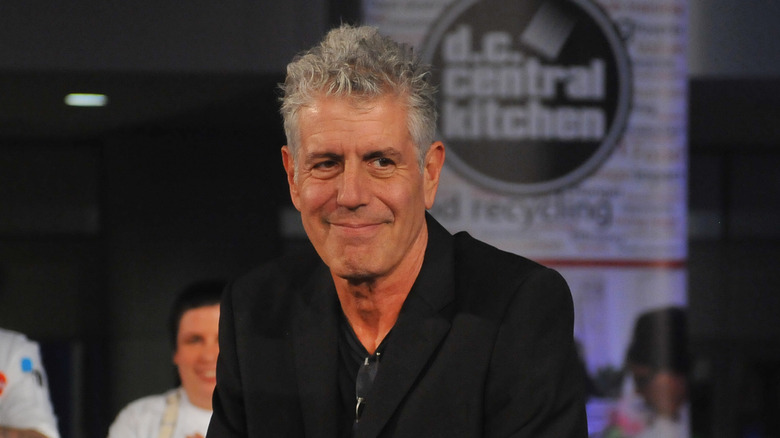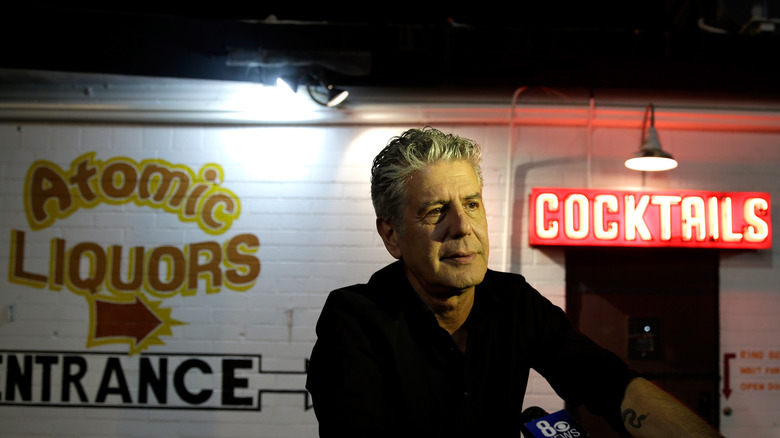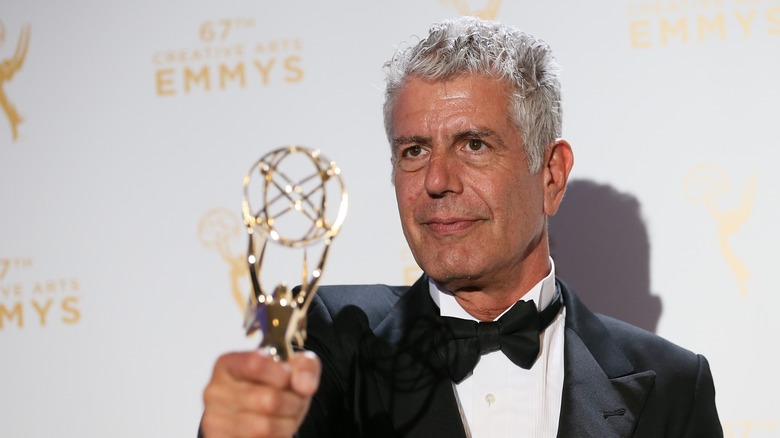Anthony Bourdain's Culinary Career Started From Humble Beginnings
We may receive a commission on purchases made from links.
Anyone Bourdain was a one-of-a-kind personality who is most famous for his best-selling book "Kitchen Confidential: Adventures in the Culinary Underbelly," and for television shows such as "Anthony Bourdain: No Reservations," and "Parts Unknown," but Bourdain's early career was much less glamorous.
Bourdain grew up in New Jersey, and attended Vassar College in Poughkeepsie, NY. During his time at Vassar, Bourdain spent his summers in Provincetown, MA where he took his first job in a restaurant kitchen as a dishwasher to help pay rent.
While he did not take the job with ambitions of becoming a career chef, Bourdain was instantly drawn to the lifestyle of a cook. From dishwasher, Bourdain was promoted to line cook, and his journey to becoming a chef began. "It was from these humble beginnings that I began my strange climb to chefdom," said Bourdain (via "Kitchen Confidential"). Once Bourdain realized that he wanted a life in the kitchen, he dropped out of Vassar and enrolled at the Culinary Institute of America where he would hone his skills for a future as a chef in New York City.
From CIA to culinary superstardom
Working in the kitchen of a busy restaurant is physically demanding, mentally draining, and completely chaotic. There is also a swagger and comradery amongst cooks that Anthony Bourdain relished and was drawn to (via "Kitchen Confidential"). After graduating from CIA (Culinary Institute of America) Bourdain took one last run at the kitchens in Provincetown before following the big lights, impossible pace, and the intoxicating (or sometimes toxic) lifestyle of being a cook in New York (via "Kitchen Confidential").
Bourdain worked at several high-profile restaurants including the Rainbow Room, The Supper Club, and eventually became executive chef at Brasserie Les Halles. Le Halles would be his last kitchen post before leaving for his tell-all book tour. It may have been "Kitchen Confidential" that launched Bourdain into something of a cult icon among fellow cooks, but his second book "A Cook's Tour," is what made him a culinary superstar when the Food Network turned it into a series. After "A Cook's Tour," the Travel Channel decided to launch "Anthony Bourdain: No Reservations," in 2005, then in 2013, Bourdain began the Emmy Award winning series "Anthony Bourdain: Parts Unknown" on CNN.
Bourdain's personality and nonchalant humor endeared him to the masses. Bourdain's shows allowed his audience to travel across the world with him in search of the next delicious bite. His ability to mention and compare fine dining and chain restaurants in one eloquent sentence made him unique and perfect for bringing international cuisine to his audience.
Why was Bourdain so influential?
Bourdain wrote and spoke with uninhibited honesty. He used humor and sarcasm as easily as his chef knife to frame the importance of cuisine and culture in a way no one previously had, endearing him to a faithful audience. Bourdain also did not seek his celebrity status, much like he did not seek to become a chef. The organic nature in which he presented the places he traveled, and how food played an important role in those communities and regions was new and refreshing to many viewers. Several years after his death, his food recommendations still pop up in daily social feeds of places to eat in NYC, and perhaps more importantly, where not to eat.
Bourdain has received 22 Emmy nominations for his television roles and has won the coveted award 8 times for "Anthony Bourdain: Parts Unknown." Highlights of Bourdain's lasting legacy include the impact and friendships he cultivated with other chefs and culinary experts along his travels including Eric Ripert of Le Bernardin in NYC who appeared on screen with Bourdain on more than one occasion. Ripert and others have begun initiatives in Bourdain's honor including The Anthony Bourdain Legacy Scholarship award at CIA as well as starting Bourdain Day which is celebrated every June 25th.



